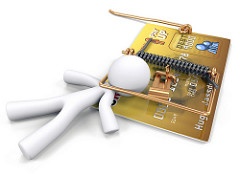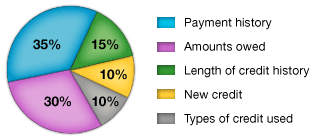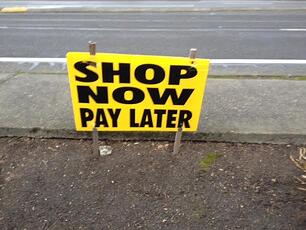Being unable to keep up with your debt payments is very stressful.
Now you get served with a SUMMONS and you are really stressed out!

For the sake of this article, I'm talking about credit accounts that are UNSECURED:
Credit Cards
Store Cards
Medical Bills
Personal Loans
Pay Day Loans
When you apply for a credit card, store card or any other unsecured account, you are agreeing to the terms to repay this debt.
If you fail to make at least your minimum payments when due, your account will become subject to all collection efforts by the creditor.
These include:
- Phone calls (lots of phone calls)
- Emails
- Mail
If these methods do not get you to start making payments again, then the creditor may elect to retain the services of an attorney to file a CLAIM.
Once the CLAIM is filed with your county's courthouse, a SUMMONS is prepared and sent out.
The SUMMONS is usually hand delivered by a courier who is paid to delivery it.
The idea of the claim/summons is to get your attention...and it works!
Over the years, most of our clients who received a summons call us almost in a panic!
It is because they do not really understand the language of the summons and think all kinds of incorrect thoughts.
For example...
The summons will state something like:
"You have 30 days to APPEAR and give an ANSWER".
Sounds like you have 30 days to show up in court, but it doesn't.
This language means that if you have undeniable proof that you do not owe what the Plaintiff (creditor) is CLAIMING, you have 30 days to submit to the court your legal ANSWER.
Most of the time you (the defendant) in the claim owes the amount claimed and so giving an ANSWER would be useless.
SO WHAT HAPPENS IF YOU DO NOT GIVE AN ANSWER?
If you continue to read the summons, it says something to the effect that if you do not give an ANSWER, then the Plaintiff may petition the court for a DEFAULT JUDGMENT.
Once a judgment has been awarded to the PLAINTIFF/CREDITOR then they have the legal right to pursue all legal methods to collect on the debt, such as:
Wage Garnishment
Bank Levy
Lien on your home
Before I continue, let's address those basic 3 options above.
If you are employed and receive W-2 income (income reported by law to the IRS), then a wage garnishment could be sent to your employer.
Your employer has not choice but to comply with the garnishment order or face severe fines!
The employer must send 25% of your NET, AFTER TAX paycheck to the Plaintiff/Creditor until the debt is 100% repaid.
This can be devastating to someone already have a tough time making ends meet!
Let's say you earn a gross monthly income of $5,000 and after tax, you are bringing home $3,500.
25% of the $3,500 would be $875, leaving you with only $2,625 to pay bills!
That's almost 50% of you gross income!
I'm going to tell you how to prevent that in a minute..
But what about a BANK LEVY?
Sometimes the Plaintiff's Attorney/Debt Collector with send out several bank levy notices to banks in your area. They use your Social Security number and in most case, will locate your bank.
Now, you go to the store and pull out you debit card to pay, but it is declined.
Calling the bank, you learn that your account has been frozen by the Levy!
Again, devastating!
Yes, the attorney for the Plaintiff/Creditor may choose to file for a lien on your home.
However, this is not used as much as options 1 and 2.
Even if there is a lien placed on your home, it DOES NOT mean that you have to sell your home right now to pay the debt!
It means that if you do not take care of this judgment debt before you sell your home in the future, the title company is forced to repay the lien in order to release the title.
So here is the big question...
HOW CAN YOU PREVENT ALL OF THIS?
DO NOT IGNORE THE SUMMONS!
The creditor wants some kind of repayment plan rather than have to deal with the expense of paying the attorney for the other options.
You should be able to negotiate either a SETTLEMENT, REPAYMENT PLAN, or a STIPULATED AGREEMENT.
While negotiating with debt collectors or attorneys for the creditor can be intimidating, it can be done.












 BACKGROUND....
BACKGROUND....



 If you live in Oregon, I've got some good news on how you can find debt relief!
If you live in Oregon, I've got some good news on how you can find debt relief!
